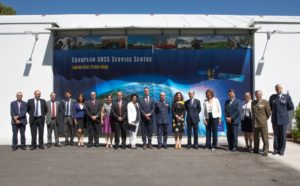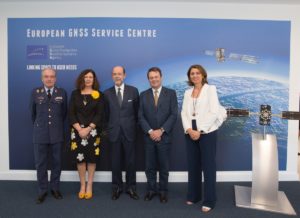
“The GSC is a key asset for the Galileo programme; it is Galileo’s door to the GNSS world,” said GSA Executive Director Carlo des Dorides. “Today, the GSA is pleased to accept this excellent facility from Spain. It is a symbol of the upcoming service phase and the single, unique interface for Galileo users.”
“Carlo des Dorides has been on board the Galileo programme from the beginning. He has played a consistent role in taking the programme forward, and his re-election as GSA Executive Director by unanimity was not by chance,” added Spanish Secretary General for Transport, Carmen Librero Pintado. “Rest assured, Spain will always be side-by-side with you.”
Ignacio Azqueta Ortiz, Director General of Spain’s National Institute for Aerospace Technology (INTA) said, “With this handover and the milestones to be reached in the near future, we look forward to continuing our tradition of collaboration with the GSA and working together towards the success of the Galileo programme.”
In his concluding remarks, Spanish Secretary of Defence Pedro Arguelles Salaverria underlined, “Now more than ever, Europe must show the world its strengths, and Galileo is one of them. Spain underlines its strong support of Europe and Galileo.”
The essential role of the GSC
By delegation from the European Commission, the GSA is charged with overseeing the operation and service provision for both the European Geostationary Navigation Overlay Service (EGNOS) (since 2015) and Galileo (as of 2017), along with managing the security accreditation and general security provision for both programmes. The GSA has been fully responsible for the GSC since its inception in 2014, a responsibility that includes serving as the GSC design authority, managing the GSC nucleus’ (GSC-n) operations and overseeing preparation contracts on infrastructure, operations and hosting service provision for the fully-fledged GSC (v1).

Ignacio Azqueta Ortiz, Director General of INTA, Carmen Librero Pintado, Secretary General for Transport, Pedro Argüelles Salaverría, Secretary of State for Defence, Carlo des Dorides, Executive Director, European GNSS Agency (GSA), Begoña Cristeto, Secretary General of Industry
Under the hosting agreement between the European Commission and Spain, INTA served as the hosting entity, with the Spanish government providing the site as an in-kind contribution. The GSC offers over 1,100 square metres of space, is home to some of the programme’s most state-of-the-art technology, and employees over 40 people
Since 2013, the GSC-n has been providing limited services and working as a precursor to GSC v1. Its key work includes supporting the lead up to the Galileo Initial Services provision, along with operating the GSC Helpdesk, disseminating orbital products to the Search and Rescue (SAR) community, supporting GNSS-related R&D and industry and monitoring user satisfaction. Once operational, GSC v1 will be connected to the Galileo core system, thus enabling the Commercial Service. It is expected to enter operations by mid-2017.
A truly European agency
The GSA is unique in that is one of the EU’s only multi-site agencies. With its headquarters in Prague, it also will run operational sites in the Netherlands, France, and the UK. With the handover of the Loyola de Palacio facility, it now adds Spain to this list. Each of the sites has its own specific function and will be staffed by specialists from the GSA and its contractors. Once the Galileo Operations Contract is awarded and Initial Services officially declared, the GSC is expected to see an increase in staff.
The site acceptance meeting was attended by representatives from the Spanish departments of defence, transport and industry, among others. Attendees were also given an overview presentation on the GSC’s role within the Galileo programme, along with a tour of the facilities.
